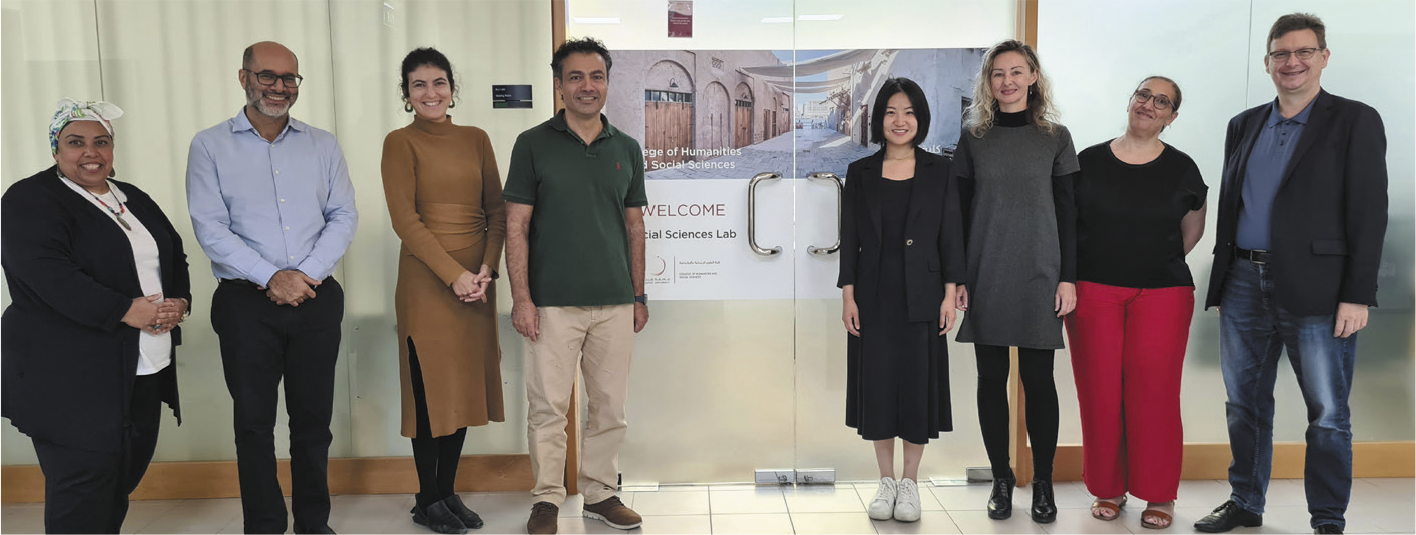Last September, APSA’s Middle East and North Africa (MENA) Program supported the Department of International Affairs and Social Sciences (IASS) at Zayed University in organizing a two-day training workshop on Quantitative Text Analysis for the Social Sciences. The training is part of APSA’s MENA Departmental Collaboration Initiative through which APSA partners with political science and related departments at universities in the Arab World to design tailored programming that supports local faculty and graduate students. At Zayed University’s IASS, where faculty are predominantly qualitative-oriented researchers, a demand emerged for training in quantitative methodology, particularly in the utilization of software for text-based research in political science, such as Critical Discourse Analysis (CDA) and sentiment analysis. While several faculty members have engaged with such research topics, they have mostly relied on qualitative methods.

Dr. Luwei Ying with faculty at the social sciences lab at Zayed University, Dubai Campus
Dr. Luwei Ying (University of California, Los Angeles) led the two-day training for faculty, introducing attendees to the fundamentals of quantitative text analysis techniques within the framework of social sciences. The sessions covered key topics, including text pre-processing, dictionary methods, supervised learning techniques (e.g., sentiment analysis, scaling, naive Bayes, SVM, random forest), unsupervised leaning (e.g., topic models), and causal inference with text data. Each method introduced was accompanied by practical applications, providing participants with a tangible understanding of their real-world utility. Beyond the theoretical knowledge, Dr. Ying designed the sessions with the aim of equipping faculty with the skills to design and implement a text analysis project from data collection to interpretation. To better prepare faculty for the workshop, Dr. Magdalena Karolak (ZU), an alumna of the 2014 MENA Workshop, conducted a preliminary introductory session on Python, the primary text analysis software used during the training.
The workshop was held at Zayed university’s recently inaugurated social sciences lab, established to provide faculty and student accessibility to various software and tools to support their research capacities, thereby promoting integration of quantitative methodologies alongside qualitative approaches. This collaboration marks the third departmental partnership between APSA and Zayed University in the last six years. Previously, APSA supported the organization of a two-day training on machine learning as a data analysis tool for the social sciences in 2022 and conducted a series of workshops in 2018 for faculty and MA students, focusing on teaching research methods.
Since 2017, APSA has supported 17 projects at six different institutions in the MENA region through the Departmental Collaboration Initiative, partnering with institutions such as Cairo University, Birzeit University, and University of Tunis El Manar. These collaborations have spanned diverse areas of trainings, including research methodology and fieldwork, thesis support for MA students, pedagogy seminars, and lectures and resources for professional development and networking.
By expanding networks and maximizing resources for both faculty members and early-career scholars, APSA envision a multi-year collaboration between its MENA Program and university departments to explore opportunities for program growth and foster excellence in the study, research, and teaching of political science. The Program accepts applications on a rolling basis; for more information, visit http://web.apsanet.org/mena/departmental-collaborations/.
Funded by Carnegie Corporation of New York, APSA’s Mena Program is a multi-year effort to support political science research and networking among early-career scholars across the Arab MENA region. For program news, updates, and additional information, visit the project Website: http://web.apsanet.org/mena/.


